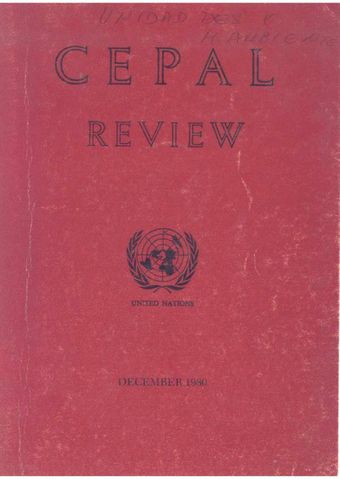-
Comments on the article “The interaction between styles of development and the environment in Latin America”
- Source: CEPAL Review, Volume 1980, Issue 12, Jul 1980, p. 51 - 68
- Spanish
-
- 12 Jul 1980
Abstract
I wish at the start of these comments to state, without false modesty, that I am one of the people least qualified to comment, because I Suffer from a sort of generational blindness towards environmental problems which, although it has been clearing up gradually, in no way qualifies me to discuss them. At all events, 1 shall put forward some points of view and appeals for caution regarding concepts and policy lines which appear in documents and presentations on these matters. At the outset, I wish to refer to and reiterate the position taken by Osvaldo Sunkel and Enrique Iglesias, that for an economist of my generation, as for many in succeeding ones, it is almost unbelievable that this vital relationship of man to the? environment or of society to its physical surroundings remained unnoticed for so long, not even appearing tangentially in our discussions. We must acknowledge and recall, modestly and even repentantly, that those who were ringing warning bells and sounding the alarm on this issue were not only listened to indifferently but often considered well-intentioned eccentrics dealing with more or less irrelevant problems compared with those which really mattered to us. I believe that all the meetings currently being bold on the subject should begin by paying homage to those who blazed the trail and raised concern over these issues, but received so little attention in the past. The economists, some absorbed by the relationship between classes and individuals and others by mercantile fetishism, overlooked the ‘little detail’, as a famous Mexican comedian would put it, that these processes took place in a finite context which was constantly being depleted or deteriorating. Not to mention the more noble aspects of the quality of life. As often happens, unfortunately, and notwithstanding the optimistic image of homo sapiens, traditional approaches only began to be reconsidered substantially after the impact and testimony of flagrant and menacing crisis exposed man’s myopia and weakness. I do not feel it necessary to belabour this point, however; what is important is that critical reconsideration has rapidly progressed and a new and integrated view of development is being developed and carrying over into action.





